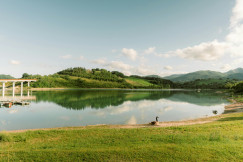Articles
25 July 2025
Working Conditions and Governance Highlights June and July 2025
Articles
25 July 2025
Working conditions and governance
Proximity and social economy
Agri-food
+63 more
Login / create an account to be able to react

The thematic area of Working Conditions and Governance plays a crucial role in shaping sustainable, inclusive, and democratic workplaces. This section highlights innovative approaches that improve employee participation, corporate responsibility, and social inclusion in economic decision-making. From the promotion of employee ownership models to fostering alignment between corporate purpose and societal impact, these initiatives contribute to stronger governance structures and better working conditions. Furthermore, leveraging EU Cohesion Funds for social enterprises underscores the need for policy frameworks that support equitable economic transitions. The following case studies showcase efforts aimed at enhancing economic democracy, fostering benefit corporations, and strengthening inclusive labour markets.
Topics
Albania
Armenia
Austria
Belgium
Bosnia and Herzegovina
Bulgaria
Croatia
Cyprus
Czechia
Denmark
Estonia
EU-27
Finland
France
Georgia
Germany
Greece
Hungary
Iceland
Ireland
Italy
Kosovo
Latvia
Liechtenstein
Lithuania
Luxembourg
Malta
Moldova
Montenegro
Netherlands
North Macedonia
Norway
Poland
Portugal
Romania
Serbia
Slovakia
Slovenia
Spain
Sweden
Switzerland
Türkiye
Ukraine
Other
Academic / Research and VET Institutions
Business Support Organisation
Company with 250 or more employees
Cluster Organisations
Consumer Organisations
Cultural and Heritage Organisations
Destination Management & Marketing Organisations
EU Institutions
Financial Institutions and Investors
Industry Associations and Chambers of Commerce
International Organisations
Local Authorities
Media / Journalist Organisations
National authorities
Networks and Federations / Confederations
NGOs / Non-profits
Notified Bodies
Regional Authorities
SMEs (a company with less than 250 employees)
Social Economy Entity
Trade Unions
Other
-
Thematic area
-
-
Working conditions and governance
-
-
Interlinkages with other sectors
-
-
Proximity and social economy
-
Agri-food
-
Construction
-
Cultural and creative industries
-
Digital
-
Electronics
-
Energy intensive industries
-
Energy-renewables
-
Health
-
Mobility, transport, automotive
-
Retail
-
Textile
-
Tourism
-
Aerospace and defence
-
-
Action areas and keywords
-
-
15-minute city
-
Access to Finance
-
Access to technology
-
Addressing capacity and skills gap
-
Advancing gender equality and safety at work
-
Blue Economy
-
Boosting digital skills by - and in the social economy
-
Buy social
-
Certification, labelling and self-regulation
-
Circular Economy
-
Clusters (including Cluster of social and ecological innovation)
-
Corporate social responsibility (CSR)
-
Creating financial incentives and supportive regulation for green and circular social economy business models
-
Data Maturity and data driven business models
-
Data sharing, Data management & Code of Conduct
-
Digital Platforms
-
Digital social innovation
-
Economic democracy
-
Education
-
Future workplaces
-
Greening infrastructures and business operations
-
Housing
-
ICP rights & workers involvement
-
Industrial relation and social dialogue
-
Innovation
-
Innovation as enabler for green transition and business development in the social economy
-
Internationalisation
-
Local employment
-
Local Green Deals, green business communities and citizens’ initiatives
-
Local Markets
-
Micro mobility
-
New business models
-
New business models – the platform economy
-
New European Bauhaus
-
Other action area
-
Public and private tech partnerships and support
-
Reinforcing Business to Business collaboration for greener and circular value chains
-
Responsible (Public) Procurement
-
Smart mobility
-
Social Finance
-
Socially oriented territorial regeneration
-
Strategy for Data
-
Supporting Digital Social Innovation & Tech for Good entrepreneurship
-
Sustainable Finance
-
Tech for Good
-
-
Ecosystem focus
-
-
Proximity economy
-
Social economy
-
-
Scope of activity
-
-
International
-
Local/neighbourhood
-
National
-
Regional
-
Share
Solid’R International: A cross-border label advancing the social and circular economy
Solid’R International is a voluntary label that certifies social economy organisations committed to ethical, inclusive, and circular practices. Active in four EU countries, it helps donors and authorities identify responsible collectors and promotes cross-border collaboration for a more sustainable economy.
Les Ateliers du Midi: Culinary Training with a Social Purpose
Les Ateliers du Midi is more than just a restaurant – it is a powerful social economy initiative in Brussels that combines culinary excellence with job training and social inclusion. As a recognised social insertion enterprise, it trains job seekers in the hospitality sector while serving high-quality, sustainable meals made from local, seasonal, and organic ingredients. The initiative empowers individuals to rebuild their lives and skills in a real-world setting, offering a dual impact: delicious food for the community and professional reintegration for its trainees.
Roma Week 2025: A Milestone for Roma Leadership, Inclusion, and Justice in Europe
Held from 7 to 10 April 2025 in Brussels, Roma Week 2025 renewed focus on Roma inclusion and leadership across the European Union. Organised in the context of International Roma Day, the event brought together EU institutions, civil society, and Roma representatives to address reciscm, promote political representation, and build cross-community solidarity. With new EU leadership and no Romani MEPs in office, the event provided a timely platform to push for structural reforms and inclusive policymaking.
Cadore – Dolomiti s.c.s.: Building Inclusive Work in the Heart of the Dolomites
Cadore – Dolomiti s.c.s. is redefining what it means to build an inclusive and sustainable economy in a mountain region. By creating job opportunities for disadvantaged individuals through community-rooted services in environment, cleaning, tourism, and catering, the cooperative combines social impact with economic resilience in one of Italy’s most remote and beautiful areas.
Ghent en Garde: Transforming Urban Food Systems for Sustainability and Equity
Ghent en Garde is a city-led initiative in Belgium promoting sustainable urban food systems by strengthening local supply chains, reducing food waste, and encouraging plant-based diets, delivering both environmental and social impact.
Comments (0)
See also
-
8
Working Conditions and Governance Highlights April and May 2025
- Categories
- Proximity and social economy Agri-food Construction +62 more
-
1 view
Urban and Rural Wellbeing Highlights: June and July 2025
- Categories
- Proximity and social economy Agri-food Construction +62 more
-
5
Regenerative Green Transition Highlights June and July 2025
- Categories
- Proximity and social economy Agri-food Construction +62 more




